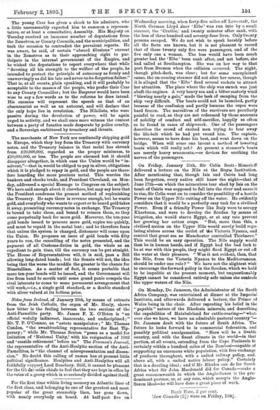The merchants of New York are continually shipping gold to
Europe, which they buy from the Treasury with currency notes, and the Treasury balance in that metal has shrunk from £20,000,000, regarded as the proper minimum, to £10,000,000, or less. The people are alarmed lest it should disappear altogether, in which case the Union would be " in- solvent,"—that is, would be obliged to pay in silver, obligations which it is pledged to repay in gold, and the people are there- fore hoarding the more precious metal. This worries the bankers and checks trade, and President Cleveland, on Mon- day, addressed a special Message to Congress on the subject. We have said enough about it elsewhere, but may say here that the President condemns the present method of replenishing the Treasury. He says there is revenue enough, but he wants gold, and everybody who wants to export or to hoard gold takes it away, presenting currency notes in exchange. The Treasury is bound to take them, and bound to reissue them, so they come perpetually back for more gold. Moreover, the ten-year gold bonds issued to procure more gold, expire too quickly, and must be repaid in the metal lent ; and he therefore fears that unless the system is changed, dishonour will come upon the Union. He proposes an issue of gold bonds with fifty years to run, the cancelling of the notes presented, and the payment of all Customs-duties in gold, the whole as an expedient to gain time, till the currency can be put straight. The House of Representatives will, it is said, pass a Bill allowing long-dated bonds ; but the Senate will not, the idea being that the worse the muddle the greater is the chance for Bimetallism. As a matter of fact, it seems probable that more ten-year bonds will be issued, and the Government will live from hand to mouth until some grand panic compels the rival interests to come to some permanent arrangement that will work,—i.e., a single gold standard, or a double standard with silver valued at its bottom price.


































 Previous page
Previous page